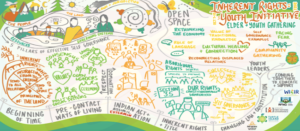Indigenous youth invited to learn about how to become inherent rights leaders

By Rick Garrick
OTTAWA — The Centre for First Nations Governance is inviting Indigenous youth to learn skills required to become inherent rights leaders and community organizers through the Inherent Rights Storytelling/Youth and Elders Gathering. The initiative includes five virtual storytelling sessions, scheduled from Sept. 15-Dec. 8, and a Youth and Elders Gathering scheduled for Dec. 15.
“We’ve asked two Elders from each community to share stories with us around the five pillars of effective governance that have been identified by the Centre for First Nations Governance, which … are the people; the land; governing systems; jurisdiction and laws; and resources,” says Amsey Maracle, Inherent Rights Youth Initiative (IRYI) coordinator at the Centre for First Nations Governance. “We’re also going to be incorporating some harvesting training, some inherent rights governance leadership training into that where we can really dive into what those stories are teaching us, what the morals are in those teachings, and how those can be used not only to reflect back on our traditional governance systems and how can it also help shape the future.”
Maracle says interested youth can register at the Centre for First Nations Governance website, adding that they can continue to register throughout the entire series.
“The main part of this whole initiative is working with that IRYI core youth team and helping them become inherent rights leaders,” Maracle says.
Maracle says the Sept. 15 visit will feature stories about the people pillar at Star Blanket Cree Nation in Saskatchewan and the Oct. 6 visit will features stories about the land pillar at Nishnawbe Aski Nation in northern Ontario.
“Nishnawbe Aski Nation is a partner on the project and we have two youth from their youth council that are also a part of our core youth team,” Maracle says.
Lyndin Belleau, a core youth team member with IRYI and Garden River citizen, says he “jumped on board immediately” with IRYI when he learned about the inherent rights component.
“Learning about our nation’s inherent rights and getting further understanding of what we had and what we can look forward to pre-contact is really what I wanted to get out of this opportunity,” Belleau says. “Just learning from all of the facilitators and Elders and Satsan (a Wet’suwet’en hereditary chief of the Frog Clan and long-time speaker for the Wet’suwet’en Nation) about court cases and jurisdictions and what traditional governance looked like before colonial settlers came to Canada was just eye opening to me.”
Belleau says he previously took an Anishinabe studies course at Algoma University where he received more of an understanding of Anishinabek governing structures.
“But learning from this [IRYI] initiative has just opened my eyes so much wider in terms of what we had and what there is and what we can look forward to in terms of trying to get back to those traditional ways of governing,” Belleau says.
Maracle says they are looking to have all of the Elders who participate in the virtual storytelling sessions at the Youth and Elders Gathering.
“The theme for this year is putting a new memory in the minds of our children and youth,” Belleau says. “One of Satsan’s quotes that he always uses in his workshops is, ‘It’s time to put a new memory in the minds of our children, time to tell them a story of hope, time to tell the story that our long struggle for the right to be self-governing is over, and we have won, and it is time to put it into practice.’”

